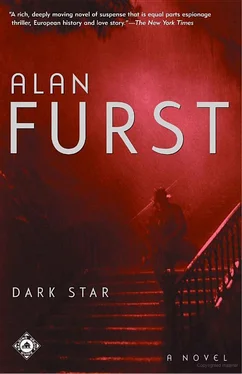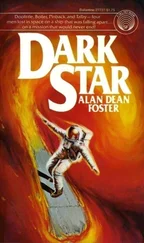Alan Furst - Dark Star
Здесь есть возможность читать онлайн «Alan Furst - Dark Star» весь текст электронной книги совершенно бесплатно (целиком полную версию без сокращений). В некоторых случаях можно слушать аудио, скачать через торрент в формате fb2 и присутствует краткое содержание. Жанр: Шпионский детектив, на английском языке. Описание произведения, (предисловие) а так же отзывы посетителей доступны на портале библиотеки ЛибКат.
- Название:Dark Star
- Автор:
- Жанр:
- Год:неизвестен
- ISBN:нет данных
- Рейтинг книги:3 / 5. Голосов: 1
-
Избранное:Добавить в избранное
- Отзывы:
-
Ваша оценка:
- 60
- 1
- 2
- 3
- 4
- 5
Dark Star: краткое содержание, описание и аннотация
Предлагаем к чтению аннотацию, описание, краткое содержание или предисловие (зависит от того, что написал сам автор книги «Dark Star»). Если вы не нашли необходимую информацию о книге — напишите в комментариях, мы постараемся отыскать её.
Dark Star — читать онлайн бесплатно полную книгу (весь текст) целиком
Ниже представлен текст книги, разбитый по страницам. Система сохранения места последней прочитанной страницы, позволяет с удобством читать онлайн бесплатно книгу «Dark Star», без необходимости каждый раз заново искать на чём Вы остановились. Поставьте закладку, и сможете в любой момент перейти на страницу, на которой закончили чтение.
Интервал:
Закладка:
Abramov spoke in a low, hoarse rumble, a voice rich with sorrow at having found all humankind to be the most absurd collection of liars and rogues. Posing a question, his face was filled with gloom. Like a teacher who knows his hopeless pupils will offer only wrong answers, Abramov was an interrogator whose subjects never told the truth. The method was ingenious. Szara understood and admired it but nevertheless felt the powerful undertow it created: he found himself wanting to please Abramov, to offer such resoundingly honest statements that the man’s sour view of the world would be swept away by idealism reborn.
Alert to Abramov’s dangerous gift, the ability to stimulate the essential human desire to please, Szara laid out his defenses with care. To begin with, resistance. Later, a strategic submission, giving up everything but that which mattered most: Marta Haecht and all the signposts that pointed to her existence. Thus Szara’s description of dinner at the Villa Baumann was laden with detail while the cast of characters was decreased by one. On visiting the wire mill he encountered the chief engineer, called Haecht, the man who might become the nominal owner of the company. A technician, Szara said, not anybody they could work with. Abramov grunted at that but did not pursue it.
Bloch and Renate Braun he assigned to the second, the confessional, stage, thus restricting the initial part of the interrogation to writing the dockworkers story in Antwerp, an uneventful journey to Prague, conditions in that city, and his rejected dispatch on the potential abandonment of Czechoslovakia. Baumann’s revelation on the manufacture of swage wire he reported in perfect detail and was rewarded by a series of appreciative grunts. This ground was then covered a second time-Abramov’s probing was artful, ingenious, a series of mirrors revealing every possible surface of the exchange. As for Khelidze, Szara described the conversations aboard the Nicaea, omitting their final confrontation in Ostend.
Until Monday of the second week, when Abramov began to show signs of restlessness. Interrogations always revealed something, something even better than a little orgy with a nightclub animateur. So? Where was it? Had he at last met a true saint? Szara caved in, warned elliptically that he now needed to say things that could not be said in a Moscow apartment. Abramov nodded sorrowfully, a physician coming at last upon the feared diagnosis, and touched his lips with his index finger. “You’ve done well today, Andre Aronovich,” he said for the benefit of the listeners. “Let us adjourn to the Metropol for a change of scenery.”
But, crunching through the fresh snow on Kusnetzki Most, they passed the Hotel Metropol and its popular cafe-where apparat operatives were in abundance-and entered instead a grimy hole-in-the-wall on a side street. Abramov ordered viesni, parfaits, which were served in chipped, grayish coffee cups but swam in fresh cream.
Szara told stage two: the corpse in the hotel, the receipt, the satchel, General Bloch, the dossier, and the American magazine editor. Abramov was a study in acute discomfort. Every word of Szara’s took him deeper into the affair and he knew it-his face knotted with pain, the encouraging grunts became groans of horror, he signaled for more viesni, swore in Yiddish, drummed his thick fingers on the tabletop. When Szara finally wound down he sighed. “Andre Aronovich, what have you done.”
Szara shrugged. How was he to have known that his orders did not come from Abramov or his associates? The second group based their play on that very assumption.
“I absolve you,” Abramov rumbled. “But I am the least of your problems. I doubt the Georgians will shoot you in Moscow, but it would be wise to watch what you eat here, and stay away from high windows. It’s a commonplace of ours; anyone can commit a murder, but suicide requires an artist. They have such artists. However, the fact that they’ve left you alone this long means they’re scheming. This too they do very expertly. After all, they are our Sicilians, these southerners, and their feuds end only one way. Apparently, they have their own plans for the Okhrana material, and have not informed the Great Leader or his official toads; thus you remain alive. Of course, if you were to publish such an article …”
“Then what shall be done?”
Abramov rumbled.
“Nothing?”
Abramov thought for a moment, spooned the last of his viesni from the coffee cup. “This khvost business is a little more complicated than meets the eye. Yes, things have happened, but. Instance: two years ago, at the trial of Lev Rosenfeld and Grigory Radomilsky- ‘Kamenev’ and ‘Zinoviev’-the prosecutor Vyshinsky, in his summation to the judges, said an odd thing, something that sticks in the mind. He called them ‘men without a fatherland.’ He would claim that he meant they’d betrayed, as Trotskyites, their country. But we’ve heard that kind of thing before, and we know what it means, just as it’s said very openly in Germany, not so quietly in Poland, and has been said in all sorts of places for a very long time.
“Still, if somebody simply yearned to believe Vyshinsky, and such people exist, let them consider the case of the diplomat Rosengolts. They played with him like a cat with a mouse: released him from all official positions and let him stew for many weeks. He knew what was coming, for a certainty, but the apparat let it fester so that every day became a hundred hours long. This was hardest on his wife, a happy sort of person, not worldly, not so educated, from a typical shtetl somewhere in the Pale. Over a period of months, the waiting destroyed her, and when the NKVD searched Rosengolts after they finally got around to arresting him, they found she’d written out a charm against misfortune, the Sixty-eighth and Ninety-first psalms, secreted it within a piece of dry bread, wrapped it in a cloth, then sewed it into his pocket.
“At the trial, Vyshinsky made much humor of this pathetic little piece of paper. He read the psalms, such as, ‘For He shall deliver thee from the snare of the hunter: and from the noisome pestilence. He shall defend thee under his wings and thou shalt be safe under his feathers: His faithfulness and truth shall be thy shield and buckler. Thou shalt not be afraid for any terror by night: nor for the arrow that flieth by day.’ You see what she’d done. Vyshinsky spoke these words in a tone of savage contempt, then asked Rosengolts how the paper had gotten into his pocket. He admitted his wife put it there and told him it was for good luck. Vyshinsky pressed him on the point, mentioning ‘good luck’ again and again, until the spectators in the courtroom were roaring with laughter and Vyshinsky turned and winked at them.
“Very well, you’ll say, the case is made. The purge is really a pogrom. But is it? Is this really true? Maybe not. The Section for Extraordinary Matters is headed by I. I. Shapiro-so if Jews are being purged, the purge is, often, guided by Jews. Now we come to the people who’ve involved you in their operation. General Bloch is a Jew, granted, though I should mention he is in military intelligence, the GRU, and not the NKVD-a fact you might keep in mind. Renate Braun is a German, likely from one of the Protestant sects, and she has nothing to do with the NKVD. She is a spez -a foreign specialist-employed by Meshdunarodnaja Kniga, the State Publishing House, where she works on the publication of German texts to be smuggled into Germany. That clearly associates her with the Comintern.
“What I’m saying is this: consider the intelligence services as an ocean. Now consider the currents that might be found in it, some running one way, some another, side by side for a time, then diverging. So new? Nothing’s new. It would be so at U.S. Steel or the British telephone company. In work there is competition, alliance, betrayal. Unhappily, when an intelligence apparat plays these games, they are equipped with very sharp tools, vast and practical experience, and the level of play can be frightful. A journalist, any normal citizen, will simply be eaten alive. What do we have here? A political battle between nationalist interests? Or a pogrom? They’re not the same thing.
Читать дальшеИнтервал:
Закладка:
Похожие книги на «Dark Star»
Представляем Вашему вниманию похожие книги на «Dark Star» списком для выбора. Мы отобрали схожую по названию и смыслу литературу в надежде предоставить читателям больше вариантов отыскать новые, интересные, ещё непрочитанные произведения.
Обсуждение, отзывы о книге «Dark Star» и просто собственные мнения читателей. Оставьте ваши комментарии, напишите, что Вы думаете о произведении, его смысле или главных героях. Укажите что конкретно понравилось, а что нет, и почему Вы так считаете.












